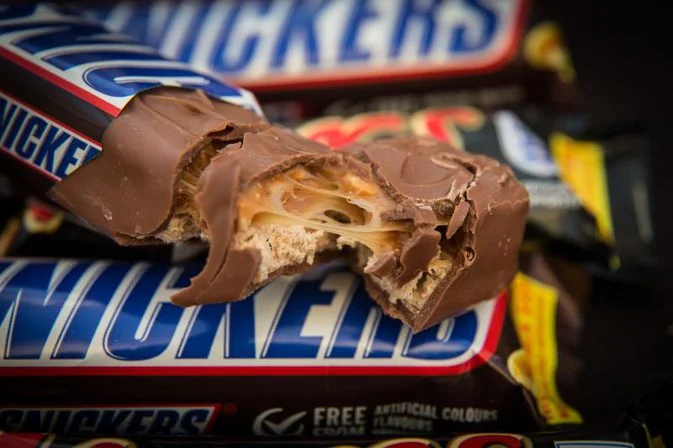It's amazing how easily we overlook the hidden powers of your plate. If you're looking to curb pain, fatigue, and more, the real answer lies in front of you (from the nutrition article "How Your Food Can Minimize Pain, Fatigue, and More").
***************
Photo Credit:
Livestrong.com: Does a Snickers bar really provide the energy you need?
Article Credit:
Author: Michael Moody Fitness with excerpt sourced from Learn Fit.
Personal Trainer Wisdom: A nutritional breakfast may not completely fuel your day but it will provide the necessary fuel that you will need until your next meal. No doubt about it – our body is equipped with the peripheral system to handle a deficiency. It doesn't mean it will operate most effectively or efficiently while operating under those constant conditions though. Eat a breakfast with the vitamins, phytonutrients, fiber, and protein that your body needs. Save the donuts for a treat (not a meal).“You’re Not You When You’re Hungry.”
So goes the famous advertising campaign which portrayed Snickers candy as a “bar of substance” that could change Betty White into a healthy 20-something man playing football with his friends. It was an ad that catapulted Snickers sales sky high with a simple message: When you’re hungry, you aren’t yourself.
While the candy bar may not be the energy-sustainer it’s claimed to be in commercials; the message rings true for nutrition. Our bodies and moods are affected when we don’t eat or when we make bad food choices. A classic example (and the one that Snickers feeds into) is skipping meals. When you miss meals, your blood sugar slumps and your mood falls right along with it. Studies have shown that a healthy breakfast really should be considered the most important meal of the day, as it helps people of all ages fuel themselves for the day, and helps enable them to make healthy choices all day long. But with busy lifestyles, it’s no wonder many of us skip breakfast completely, or eat something devoid of nutrition (like donuts) on the go. But a processed breakfast won’t cut it if we want to reap nutritional benefits.
Personal Trainer Wisdom: Whether you routinely endure bouts of gout or experience chronic pain, the answer to your relief may lie on your plate. Not only do you want to incorporate the appropriate nutritional ratio for your body to operate efficiently, but you also want to avoid the big inflammatory six: dairy, alcohol, grains, red meats, processed foods, and refined sugars. While this list will depress any Midwestern resident, it shouldn't be ignored. If you're not prepared to go "all in," you may want to see what you can get away with by removing a little of each from your diet.Minimize Pain, Inflammation, and More
Doctors at the Mayo Clinic note that a healthy diet for everyone should include fruits, vegetables, and lean proteins. Furthermore, people suffering from pain should avoid foods that exacerbate inflammation. Inflammation leads to pain and is the body’s response to foods like refined sugar, processed flour, cereals, white rice, potatoes, and red meats. Eliminating these foods from your diet can help if you suffer from chronic pain. Certain foods also have analgesic (pain-relieving) properties. Adding colorful fruits and vegetables supplies your body with rich vitamins and omega-3s to regulate pain.
Personal Trainer Wisdom: The connection between the mind and body extends beyond a meditation session on a pier in Guatemala. Any deficiency or improper nutrition will affect all aspects of your health (including your mental and emotional health).Nutrition and Depression
Body chemistry is also important when it comes to the treatment of depression. We typically think of depression as an emotional issue, but what goes into our bodies matters. In addition to emotional triggers, psychological triggers, and biochemical imbalances, nutritional deficiency can contribute to depression. Lack of amino acids, omega 3s, and vitamin D play a role. Understanding blood sugar and food intolerance are also important, and increasing intake of specific vitamins and nutrients can be a big factor in treating depression.
Personal Trainer Wisdom: When your basic needs for survival are met, you will have the strength, energy, and focus to participate effectively and efficiently in the world. Make your nutrition a priority. It is the foundation of your physical, mental, and emotional self.A Broken Record Worth Listening To
If this is starting to sound like a broken record, that’s because the message is consistent: Managing blood sugar, reducing processed foods, and increasing intake of colorful vegetables and fruits are effective strategies in managing health. But could nutrition even help with drug and alcohol rehabilitation? As a matter of fact, it can play a huge role in addiction recovery. Drug and alcohol use is often coupled with bad nutritional habits that vary depending on the class of substance; for marijuana users, obesity may be an issue, while stimulant users may be severely underweight. In any case, good nutritional habits can reduce withdrawal symptoms, repair damaged cells, and reduce the risk of relapse. That’s because proper nutrition helps deter exhaustion or mood issues that may lead to using again. It is also an important part of how your body naturally detoxes and can reduce the discomfort of withdrawal.
It is amazing how a diet rich in vitamins, protein, and complex carbohydrates not only improves weight but can also reduce or eradicate the symptoms of illness and disease. A healthy diet can be preventative, but also curative.
***************
Photo Credit:
Livestrong.com: Does a Snickers bar really provide the energy you need?
Article Credit:
Author: Michael Moody Fitness with excerpt sourced from Learn Fit.































